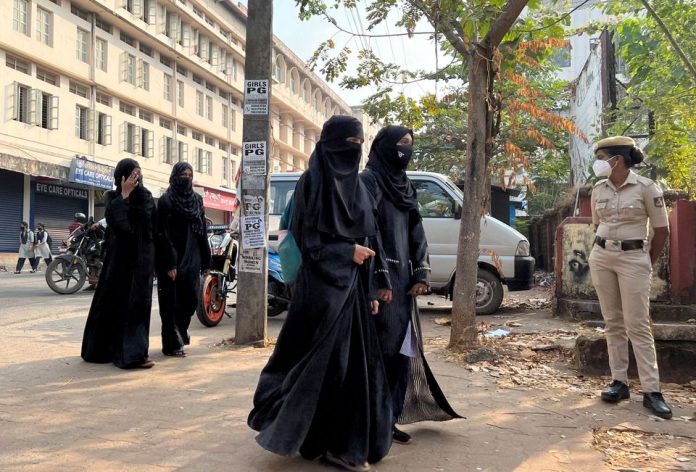An Indian court upheld on Tuesday a ban on wearing of the hijab in classrooms in the southern state of Karnataka, a ruling that could set a precedent for the rest of the country which has a big Muslim minority.
The ban last month by the state had sparked protests by some Muslim students and parents, and counter-protests by Hindu students. Critics of the ban say it is another way of marginalising a community that accounts for about 13% of Hindu-majority India’s 1.35 billion people.
“We are of the considered opinion that wearing of hijab by Muslim women does not form a part of essential religious practice in Islamic faith,” Chief Justice Ritu Raj Awasthi of the High Court of Karnataka said in the judgement.
He said the government had the power to prescribe uniform guidelines, dismissing various petitions challenging the ban ordered by Karnataka.
“We are of the considered opinion that the prescription of school uniform is only a reasonable restriction constitutionally permissible which the students cannot object to,” Awasthi said.
Ayesha Imthiaz, a third-year undergraduate student in the Karnataka district of Udupi where the protests began, said she would either drop out of her government-aided college or opt for a correspondence course. She said her fellow Muslim female students were planning to do the same.
“We can’t take off the hijab, we won’t take off the hijab,” she said. “We have fifth semester exams next month. We will have to sit that out unless things change by then.”
Ahead of the verdict, Karnataka authorities announced closures of schools and colleges and imposed restrictions on public gatherings in some parts of the state to prevent potential trouble.
























































![[FREE FREE MONEY] Predict and Win a Guaranteed GH¢200 From Us EVERY WEEK](https://wordpress.ghanatalksradio.com/wp-content/uploads/2022/02/Predict-and-Win-Final-09-03-2021-218x150.jpg)
![[Predict & Win – 8th/Oct.] WIN A Guaranteed ¢200 From Us This Week](https://wordpress.ghanatalksradio.com/wp-content/uploads/2021/10/maxresdefault-16-218x150.jpg)
![[Predict & Win – 2nd] WIN A Guaranteed ¢200 From Us This Week](https://wordpress.ghanatalksradio.com/wp-content/uploads/2021/09/maxresdefault-50-218x150.jpg)
![[Predict & Win – 25th] WIN A Guaranteed ¢200 From Us This Week](https://wordpress.ghanatalksradio.com/wp-content/uploads/2021/09/maxresdefault-36-218x150.jpg)
![[Predict & Win – 18th] WIN A Guaranteed ¢200 From Us This Week](https://wordpress.ghanatalksradio.com/wp-content/uploads/2021/09/maxresdefault-23-218x150.jpg)









![[National cathedral] See full list of churches that have contributed since 2018](https://wordpress.ghanatalksradio.com/wp-content/uploads/2020/09/Ghana-National-Cathedral-GhanaTalksRadio-100x70.jpg)


![[7.8 earthquake] Two children, 3 women dug out alive from Turkey rubble after 228 hours](https://wordpress.ghanatalksradio.com/wp-content/uploads/2023/02/Turkey-earthquake-100x70.jpg)
